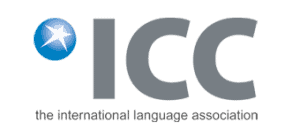2017 – 24th Annual Conference, Graz
Conference Review
Conferences are often about three things: meeting friends and colleagues you haven’t seen for a while (frequently because they live a long way a way); meeting new people who share similar interests and passions and learning things that you can take away and use in professional life. To judge by the reaction of delegates to the ICC conference in Graz, the event succeeded on all three counts. Under the theme The use of ‘New Media’ in Language Education, speakers shared experiences from the UK, Spain, Mexico, Austria and beyond. Wide ranging uses of technology as an enabler for broadening access and enhancing learning were featured – without ever losing sight of new media in support of good pedagogy.
The tone was set by Rob O’Dowd, speaking on how to achieve genuine intercultural communication using the Internet. Ursula Stickler showed us how the Open University in the UK organizes its programmes and supports its learners. Eva Groestenberger showed how e-learning can be made interactive and motivating through e-books. Elsewhere there were highly engaging presentations on automated speech recognition and the use of video games as a learning tool. There were wider perspectives from the worlds of testing and publishing and discussions on language as a soft power tool. Throughout, the underlying theme of what ‘New Media’ might mean for teachers and teacher education was what drove the two days. It is this coherence of purpose that makes ICC conferences successful and thanks is due to once again Tony Fitzpatrick, the founder of the organization, for being the driving force behind the event.
Key Note Speaker
Ursula Stickler (Opening Keynote Speaker)
Teaching Languages at the OU using New Media Challenges and Solutions
Open University (OU), UK. Senior Lecturer (German) Faculty of Wellbeing, Education & Language Studies School of Languages and Applied Linguistics & Languages Ursula joined the Department of Languages in 2002 as a lecturer in German and has contributed to German courses at all levels, to English for Academic Purposes and to the OU Chinese beginners’ course. Through tandem learning projects and teacher training activities she has supported the integration of autonomous learning in German and Chinese.
As a researcher and trainer she has specialised in autonomous learning and online language teaching skills, contributing to an international network of experts. ECML projects based on this collaboration (DOTS, moreDOTS, and ICT-REV) have led to multiple workshops across Europe and peer-reviewed publications. As the Convenor of the OU department’s Open Languages Research Group, she has been co-ordinating research and scholarship, organising presentations and visits by international experts, and mentoring colleagues who are relatively new to research since 2011. In 2014 she joined Andy Gao, Lluisa Astruc and Sarah Mercer as co-editor of System: An International Journal of Educational Technology and Applied Linguistics.
She is a Senior Fellow of the Higher Education Academy (HEA) and member of the Austrian society for research in teaching German as a foreign language (WGDaF).
Michael Carrier
Speech recognition and its impact on learners
Michael Carrier is Managing Director of Highdale Consulting Ltd, based in London, and consults for Cambridge English Language Assessment & other organisations. He has been involved in ELT for over 30 years as a teacher, trainer, author, school director and network director. He has worked in Germany, Italy, Poland, UK and the USA, and lectured in many other countries worldwide.
He was formerly CEO of the International House World network of schools, Executive Director of Eurocentres in Washington D.C., and most recently Director of English Language Innovation for the British Council. He was also formerly an Associate Professor at New School University, New York for the MA in TESOL. He has written a number of ELT coursebooks and skills books, including the Front Page series, Business Circles, Intermediate Writing Skills and Spotlight Readers.
His special field of interest is Digital Learning and the application of technology to Language Teaching, and he was Editor of the Technology section of Modern English Teacher. He is co-editor of Digital Learning, to be published by Routledge Education in 2017. He is currently serving on various Boards, in addition to the Board of ICC, as a Trustee of the TIRF Foundation in the USA, Governor of International Students’ House in London, and a member of the Advisory Board of OUP’s English Language Teaching Journal (ELTJ). He is a Fellow of the Royal Society of Arts, a Member of the Institute of Directors, the Society of Authors, and the Oxford & Cambridge Club.
Robert O’Dowd
Virtual Exchange and Internationalising the Classroom
Dr. Robert O’Dowd comes from Ireland. He is associate professor in English as a Foreign Language and Applied Linguistics at the University of León, Spain. He has taught at universities in Ireland, Germany and Spain and has published widely on the application of Virtual Exchange in university education. His most recent publication is the co-edited volume Online Intercultural Exchange Policy, Pedagogy, Practice for Routledge. He has participated in many international projects and recently coordinated INTENT – a project financed by the European Commission aimed at promoting online intercultural exchange in European Higher Education (www.unicollaboration.eu). He is currently coordinating the Erasmus+ Key Action 3 project Evaluating and Upscaling Telecollaborative Teacher Education (EVALUATE).
Telecollaboration, or ‘Virtual Exchange’ refers to the application of online communication tools to bring together classes of learners in geographically distant locations with the aim of developing their foreign language skills, digital competence and intercultural competence through online collaborative tasks and project work. Many recent studies have explored the potential of this activity for supporting collaborative language learning and developing intercultural competence in learners (Dooly & O’Dowd, 2012, Guth & Helm, 2010; O’Dowd, 2011, 2013).
This session will begin with a brief presentation of the different models and approaches to Virtual Exchange which are currently being used in secondary and higher education contexts and will review what the activity has contributed to internationalising university education to date. It then goes on to focus on the challenges for educators and outlines the skills, attitudes and knowledge which are required to establish and carry out successfully an online intercultural exchange between university classes. The presentation will also look briefly at the www.unicollaboration.eu platform which supports university lecturers interested in establishing and running telecollaborative exchanges. In the practical workshop, participants will have opportunities to explore how they could include Virtual Exchange in their particular teaching contexts and where they can find partner classes and tasks for their own exchange initiatives.
His publications are available here: http://unileon.academia.edu/RobertODowd
and you can follow him on twitter: @robodowd
Eva Groestenberger
Languages 4.0 – Teaching languages in the digital age
This presentation looks at the potential of learning management systems in language teaching and learning. In particular, it deals with the ways that platforms, new media and new technologies can support teachers and students in the learning process. After thirteen years of teaching English in blended learning scenarios at both secondary and university level, the speaker will demonstrate how learning management systems can help students to become independent language learners and support teachers in describing and assessing students’ progress.
The speaker will argue that new media and new technologies can support – or are indeed indispensable for – this process. In this context, interactive, multimedia “Harry Potter” books will be introduced at the centre of content creation in a blended learning setting. Furthermore, open educational resources for the learners’ skills development will be presented.
Rob Williams
Being virtually intercultural in the workplace
Former chair of the ICC, Rob Williams has over 30 years experience in language education as a teacher, teacher trainer, materials writer, assessor and consultant. He also trained as a conference interpreter and for the past 15 years has been involved in teaching intercultural communication directly in company and within trainer training. He is currently a principal lecturer in the department of Modern Languages and Cultures at the University of Westminster, where he teaches on the MA TESOL (leading modules on Testing and Materials Development) and is course leader for the MA International Liaison and Communication, a pioneering course, training people to be the bridge across communities and between language groupings.
Rob has a wide experience in teaching English for business. He taught executives in small groups and on a one to one basis (companies included Kingfisher, Shell, London Stock Exchange). He worked with engineers and commercial sector employees from Siemens, and he was the academic manager of pre-sessional MBA and MSc Finance Programmes at City University, London. This experience has extended into the field of intercultural communication, working with multicultural teams and preparing employees for placements in different countries (companies included Rolls Royce, CORUS, Reckitt Benkiser and Barclays)
As a materials designer, Rob has published both general and specific purpose course books as well as being heavily involved in creating and improving courses for agencies where he worked. In his time at City University, Rob wrote the pre-sessional courses for the MBA and MSc Finance programmes in general finance, shipping and real estate management. At Siemens, he rewrote the in house programme for engineers and designed a four level course for call centre operatives.
Through the ICC and the University of Westminster, Rob has been involved in many EU co-funded development projects. He was an external commentator for the PELLIC project (providing English Language in the context of practice enterprises), contributed to the design of materials for Chinese 4 EU (providing instruction in Chinese through virtual platforms) and was a trainer on the Diverse European Workplace project (providing intercultural communication training in the workplace). He was a lead materials developer for Linguapeace and Linguapeace Europe (producing two books training English for peacekeepers) and led the PICT project promoting intercultural communication in translators. He is currently the internal quality assurance member for CoMoViWo – a project designing intercultural communication training material in English and Spanish, with a specific focus on e-communication.
He chairs an annual Intercultural Masterclass through UK Trade and Industry and regularly speaks at conferences across Europe and beyond. In his teaching, Rob has frequently worked with students, employees and executives who have been called upon to perform in situations where they have not had sufficient language competence to do so. This and the intercultural and non-verbal causes of misunderstandings form the core of his research interest.
Rob is a passionate believer in the need for improved communication as a means to greater social understanding, and feels that maintaining high quality language instruction combined with intercultural competence goes a long way to achieving this.
Away from languages Rob teaches singing for the terrified and writes and records music – some of which has appeared in educational publications and at conferences.
Ian McMaster
Digital this, digital that: a publisher’s perspective
If you ask the established language publishers what their biggest challenge is at present, you are likely to get the answer “digital transformation”. Specifically, the challenge is how to transform traditional (paper-based) business models into ones in which a considerable proportion of revenues come from digital sources. But is such a transformation possible? Or is there an inherent contradiction between the kind of digital model that publishers would like and the wishes of their consumers? And can traditional publishers compete digitally with the new venture-capital-financed players that are disrupting the market?
This session will address such issues with examples from the experience of Spotlight Publishing, Europe’s leading publisher of language-learning magazines.
A lively discussion is expected on the topics of digital transformation and market disruption.
Bio:
Ian McMaster is editor-in-chief of the bi-monthly business communication magazine Business Spotlight (www.business-spotlight.de). The magazine is aimed at German speakers who need English at work. In 2007, the magazine was awarded the title of Germany’s Trade Journal of the Year for the category “Law, science, tax and business”.
Ian joined Spotlight Publishing (www.spotlight-verlag.de) in Munich in 1992. He was editorin- chief of the monthly English magazine Spotlight (www.spotlight-online.de) from 1995 to 2003 and again from 2006 to 2009. He was the founding editor of Business Spotlight in 2001 and is a former coordinator of the worldwide business English teachers’ organisation, IATEFL-BESIG (www.besig.org).
Ian is the co-author with Bob Dignen of the books Effective International Business Communication and Communication for International Business (both Collins) and of the ebook English for Business: 100 Tips for Effective Communication (Spotlight Publishing)
Thomas Kelly
“Gamification”: Virtual worlds for language teachers and for CLIL?
This presentation on Gamification and machinima for language learning/teaching and CLIL will introduce participants to the world of Gamification, leading to discussion on its possible use in language teaching and learning and the possible use of machinima. “Gamification” is the use of game thinking and game mechanics in non-game contexts to engage users in solving problems and increase users’ self contributions.”
One of the chief problems encountered in the introduction of video games in FLT & FLL is the lack of knowledge of and familiarity of language teachers with virtual worlds. The amount of time and effort many teachers require to familiarise themselves with techniques and technology necessary for satisfactory deployment of virtual world environments in their teaching often intimidates many teachers, particularly those with heavy teaching schedules.
Perhaps a comparison may be made here with introducing potential language teachers to the skills of language teaching with or without a textbook. Obviously, it is much easier for teachers to approach the task of language teaching, if they have a whole array of ready-made materials available which will include material with which they can introduce and exercise the necessary skills for language acquisition.
One would hardly expect each and every language teacher to develop his/her own, individual language teaching textbook, with all the necessary elements (exercises, mini dictionary, audiovisual materials, etc., etc.) Here, it is important to remember that using a language teaching/learning textbook does not mean that teachers have to follow the content slavishly, but may adapt materials, exercises etc. to the perceived needs of their learners.
The use of ready-made games to introduce language teachers to the world of machinima can fulfil a similar function to that of the standard textbook, provided that the games chosen expose learners to a wide variety of examples of language use, suited to the needs, wishes and level of the learners.
Professionally produced materials in the world of video games can be aesthetically pleasing, both in terms of visuals and in terms of the language they may generate. Manipulation of the avatars is fairly straightforward, as parts of their actions have been automated.
The purpose of this webinar is to illustrate how attractive, widely used video games may be profitably deployed in the field of language teaching/learning to stimulate interest in the use of this genre in language learning and language teaching, providing novices with ready-made materials which may be adapted to the particular needs of different learning groups.
Tom Kelly is a coordinate bilingual in German and English. His (German) mother is a medical doctor and his (Australian) father is a retired teacher, with extensive experience of teaching a wide range of pupils and students in a number of geographical settings, most often within the context of international schools.
Tom studied computer sciences at the University of Frankfurt. During his course of studies, he worked on a part-time basis for German Railways (Deutsche Bahn – DB), chiefly as a programmer and designer of programs designed to solve logistical problems. After graduation in 2015, he was taken on by DB on a full-time basis.
He has been playing computer games since the age of three, when his grandfather introduced him to this genre. He has also designed his own computer games, and continues to follow developments in this area.
His webinar will introduce language colleagues to a range of videogames which he believes will be of interest to those engaged in the area of language learning and language teaching. He does not profess to be an expert in the area of language learning and teaching, but looks forward to lively discussions with language professionals with reference to the potential that gamification has for language learning and language teaching, and as an introduction to virtual worlds for language teachers.
Barry Tomalin
Language, culture and influence – How language and culture training supports national profile Workshop
To what extent nowadays does the language we speak identify us culturally? What, if any, is the impact of electronic delivery of language on intercultural awareness and understanding and? To what extent does learning a language mean learning to identify with a particular culture or cultures? And to what extent does language knowledge influence us in favour or against native speakers and the places where the language is spoken? ‘Soft Power’, ‘Nation Brand’ and ‘Place Brand’ are terms coined by Joseph Nye and Simon Anholt to identify policies and practices that ‘win hearts and minds’ and create identity with a particular country or city to encourage exports, tourism, direct inward investment and raise international profile. To what extent is learning a language one of these instruments and can we measure its impact?
Barry is an ICC Board Member and joint Managing Editor of ICC’s flagship peer-reviewed academic journal, Training Language and Culture (TLC). He is visiting Lecturer at the Academy of Diplomacy and International Governance at Loughborough University London and co- author of ‘World Business Cultures –a Handbook 3rd Edition’ (Thorogood Pubblishing 2014) and ‘Cross-Cultural Communication: Theory and practice’ (Palgrave Macmillan 2013)




























































